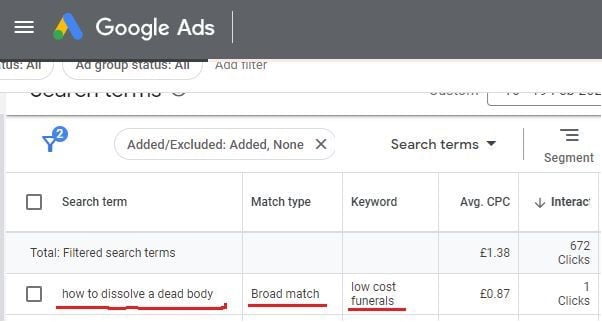
Free Digital Marketing Review
Elevate your online strategy with a personalised report and expert insights. Achieve your business goals faster!
Online advertising requires a delicate balance between casting a wide net to capture potential customers and honing in on specific audience segments to maximise campaign effectiveness. With Google Ads, one of the key decisions advertisers face is selecting the appropriate keyword match type to target their desired audience. Among these options, broad match keywords stand out for their ability to reach diverse users and expand campaign reach exponentially.
Broad match keywords allow advertisers to tap into a vast pool of potential customers by allowing their ads to appear for a wide range of search queries, variations, and related terms. This approach can be particularly advantageous for businesses seeking to increase brand visibility, explore new keyword opportunities, and scale their advertising efforts efficiently. However, with this expanded reach comes inherent challenges and risks that advertisers must carefully navigate to ensure the effectiveness and profitability of their campaigns.
In this blog, we’ll delve into the pros and cons of using Google Ads broad match keywords, exploring the opportunities they present for increased reach, flexibility, and discovery and the potential pitfalls such as irrelevant traffic, limited control over ad placement, and budget overruns. By understanding the advantages and drawbacks of broad match keywords, advertisers can make informed decisions to optimise their campaigns and achieve their advertising goals effectively.
Pros of Using Google Ads Broad Match Keywords:
Increased Reach and Visibility:
Broad match keywords allow your ads to appear for a wide range of search queries, maximising your reach and visibility. This can be particularly beneficial for businesses looking to expand their audience or increase brand awareness. By casting a wide net, you can capture potential customers searching using various terms related to your products or services.
However, the downside to this increased reach is that your ads may appear for irrelevant or less relevant searches, potentially leading to wasted ad spend.
Time and Resource Efficiency:
Broad match keywords can save time and resources by automating the process of keyword targeting. Instead of manually adding numerous specific keywords, broad match allows Google’s algorithm to match your ads to relevant search queries automatically. This streamlines the campaign setup process and reduces the need for constant keyword monitoring and adjustments.
Nonetheless, relying solely on broad match keywords without regular monitoring can lead to missed opportunities and inefficient spending, as the algorithm may not always accurately match your ads to relevant searches.
Discovering New Keyword Opportunities:
Broad match keywords can help uncover new opportunities you may not have considered. You can identify additional search terms driving traffic and conversions to your website through the data gathered from broad match keyword performance. This insight can inform your keyword strategy and potentially lead to the discovery of valuable long-tail keywords or niche markets.
On the other hand, without proper monitoring and optimisation, broad match keywords may also reveal irrelevant or low-converting search queries, which could dilute the effectiveness of your ad campaigns.
Flexibility and Adaptability:
Broad match keywords offer flexibility and adaptability, allowing your ads to show for a wide range of user intents and variations of your target keywords. This flexibility can be particularly advantageous in dynamic industries or seasonal markets where search trends fluctuate frequently. By utilising broad match, you can ensure that your ads remain visible to potential customers regardless of shifts in search behaviour.
Nevertheless, this flexibility comes with the risk of your ads being displayed for searches that are not closely aligned with your business objectives, potentially leading to lower click-through rates and conversion rates.
Easy Scaling and Expansion:
Broad match keywords facilitate easy scaling and expansion of your advertising campaigns. Whether you’re looking to target new geographic regions, launch new products, or reach different audience segments, broad match keywords provide a straightforward way to broaden your campaign reach without extensive keyword research and manual adjustments.
However, expanding too quickly without proper optimisation and monitoring can result in wasted ad spend and ineffective targeting, as your ads may appear for irrelevant or low-quality searches.
Cons of Using Google Ads Broad Match Keywords:
Risk of Irrelevant Traffic:
One of the primary drawbacks of broad match keywords is the risk of attracting irrelevant traffic to your website. Since broad match allows your ads to appear for a wide range of search queries, there’s a higher likelihood of your ads being shown to users who are not genuinely interested in your products or services. This can result in wasted ad spend and lower conversion rates.
Despite the potential for increased reach, businesses must carefully monitor their broad match keyword performance and regularly refine their keyword lists to minimise the impact of irrelevant traffic.
The image below is a prime example of irrelevant traffic we witnessed last week!

Limited Control Over Ad Placement:
Broad match keywords offer less control over where your ads are displayed compared to more targeted keyword match types like phrase match or exact match. With broad match, Google’s algorithm determines when to show your ads based on the relevance of the search query to your keywords. This lack of control can lead to your ads being displayed in contexts that may not align with your brand or campaign objectives.
Advertisers can use negative keywords to exclude irrelevant search terms and improve ad targeting within broad match campaigns to mitigate this risk.
Potential for Keyword Cannibalisation:
Broad match keywords may inadvertently compete with other keywords in your campaign, leading to keyword cannibalisation. When multiple keywords within the same campaign are too similar or overlap in intent, they may end up bidding against each other for ad placement, driving up costs and reducing overall campaign effectiveness.
Advertisers should carefully structure their campaigns and ad groups to avoid keyword cannibalisation, ensuring that keywords are organised logically and serve distinct purposes.
Difficulty in Performance Optimisation:
Optimising the performance of broad match keywords can be challenging due to the sheer volume of potential search queries they can match with. Unlike more targeted match types, broad match requires ongoing monitoring and refinement to identify and capitalise on high-performing keywords while excluding irrelevant ones. This process can be time-consuming and resource-intensive, especially for advertisers managing large and complex campaigns.
Employing automation tools and regularly analysing performance data can help streamline the optimisation process and improve the efficiency of broad match campaigns.
Potential for Budget Overruns:
Broad match keywords pose a higher risk of budget overruns than more restrictive match types. Since broad match allows your ads to appear for a wide range of search queries, there’s a greater likelihood of your ads receiving clicks from users who may not convert or contribute to your campaign goals. Without careful budget management and monitoring, this can lead to overspending and diminished return on investment (ROI).
Advertisers should set daily or campaign-level budget caps and closely monitor their ad spending to prevent budget overruns and ensure optimal allocation of resources.
Summary:
In summary, Google Ads broad match keywords offer several advantages, including increased reach and visibility, time and resource efficiency, and the ability to discover new keyword opportunities. They also provide flexibility, adaptability, and easy scaling and expansion of advertising campaigns. However, broad match keywords come with inherent risks, such as attracting irrelevant traffic, limited control over ad placement, and the potential for keyword cannibalisation. Optimising performance and preventing budget overruns can also be challenging with broad match campaigns. Advertisers must carefully monitor performance, refine keyword lists, and employ strategic targeting tactics to maximise the benefits of broad match keywords while mitigating their drawbacks.

Need help with your website and marketing?
Book a FREE growth strategy session with our experts
Our award-winning team will review your website and marketing goals to provide you with crucial insight and advice.

4.9 STAR
Google reviews
With 10+ years of experience, Link Digital has helped hundreds of businesses to succeed online. We can help yours too!

